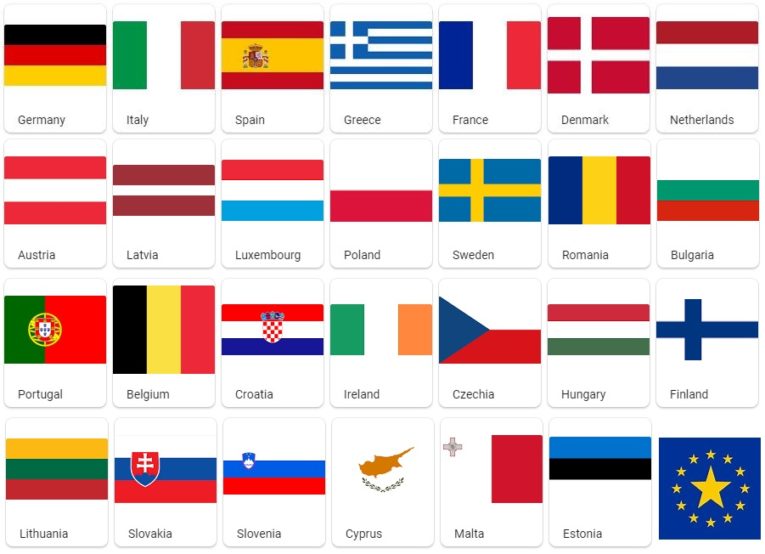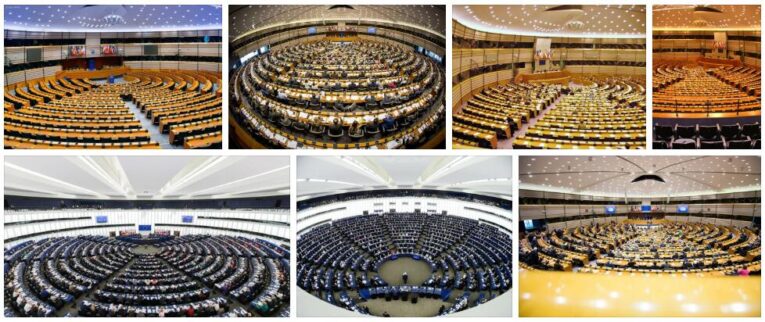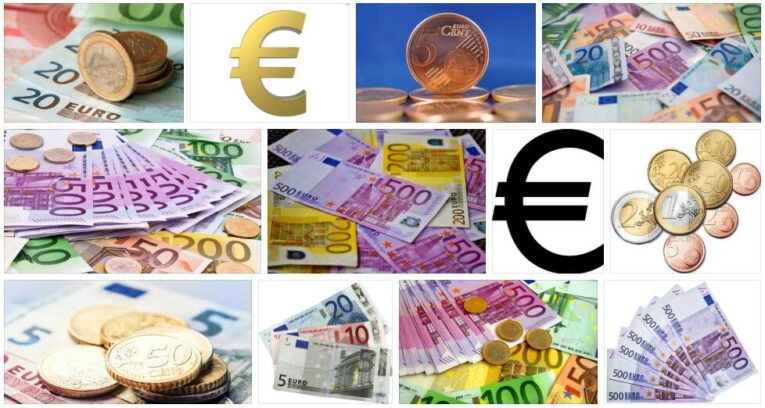Here are some events and decisions within the EU that were noticed in 2009. During the year, the new EU Treaty (the Lisbon Treaty) came into force.
Direct debit to pay bills should be done across national borders throughout the EU. Many bank customers use direct debit to pay recurring bills for eg. rent, electricity, water and telephone. Previously, direct debit could only be used for payment to companies located in the same country as the customer’s bank. In November 2009, 2,500 European banks began offering autogiro across national borders. By November 2010, all banks in the euro area should have introduced limitless autogiro. In countries outside the euro area, including Sweden, banks should have introduced European direct debit by November 2014.
The European Court of Justice, officially the European Court of Justice, renamed the former European Court of Justice. The name change came about when the Lisbon Treaty came into force on December 1, 2009. The concept of the EC disappeared as the EU’s pillar structure ended with the new treaty. The main tasks of the European Court of Justice are to judge disputes between Member States and EU institutions, and to interpret EU law.
European Commission. During the autumn, the Commission was re-casting, whose five-year term expired in 2009. The Commission consists of 27 Commissioners, one from each country. The Portuguese President José Manuel Barroso was nominated in June by EU Heads of State and Government for another term as President of the Commission. After voting in the European Parliament, Barroso gained renewed confidence for the next five years as well. Vice President of the EU Commission became Catherine Ashton, the EU’s newly appointed High Representative on Foreign and Security Affairs.
During the year, Member States presented their proposals to Commissioners. As a successor to Margot Wallström, who has been Commissioner since 1999, Cecilia Malmström was launched by the Swedish government. Malmström is home to the EU environment after experience first as an EU parliamentarian and then as EU minister in the Swedish government. When Manuel Barroso presented his proposal for a new commission at the end of November, Cecilia Malmström had been assigned responsibility for home affairs, including EU police cooperation, border control, security, asylum and migration. Finland’s Commissioner Olli Rehn had been assigned the post of Commissioner for Economic and Monetary Affairs. Other important areas of responsibility included climate issues in Denmark, energy issues in Germany, industrial issues in Italy and internal market issues in France.
EU parliament. According to COUNTRYAAH, elections to the European Union parliament were held in June in the 27 EU countries, with a total of about 500 million inhabitants and around 380 million voters. The turnout in the EU as a whole was 43 percent, which meant a reduction of a few percentage points from the 2004 elections. In 1979, when there were only nine member states, the turnout was about 62 per cent. Since then, the share of voting rights of voters has constantly dropped. The proportion of female EU MEPs has increased year by year, from 16 percent in 1979 to 35 percent at this year’s election. Almost half of the MPs were newly elected in 2009. In the new parliament, the members’ ages range from 25 years to 81 years. Among the Swedish parliamentarians, moderate Christofer Fjellner was the youngest with 32 years and Christian Democrat Alf Svensson the aged man with his 70 years.
The people of Sweden went to the polls on June 7, where they could choose from 413 candidates from 13 parties. The June list resigned from the European Parliament, while the Pirate Party came in for the first time.
In Parliament, the members of the countries are divided from a large number of national parties into seven groups. The election results showed that the EPP, the Group of the European People’s Party (from Sweden includes the Moderates and the Christian Democrats), consolidated its position as the largest bloc with the most votes, 36 percent. The second largest group, 25 per cent, became S&D, the Progressive Alliance of Social Democrats in the European Parliament (Sweden includes the Social Democrats). The third largest voter, 11.4 percent, was ALDE, the Group of Alliance Liberals and Democrats for Europe (Sweden includes the People’s Party and the Center Party). Then followed GREENS / EFA, the Group of the Greens / European Free Alliance (from Sweden includes the Environment Party and the Pirate Party), with 7.5 percent; ECR, European Conservatives and Reformists, with 7.3 percent; GUE / NGL The European United Left / Nordic Green Left group (from Sweden includes the Left Party), with 4.8 percent; EFD, the Group on Freedom and Democracy in Europe, with 4.3 percent and NA, Groupless, with 3.7 percent.
At the EU elections, 736 seats were allocated in Parliament. The Lisbon Treaty represents an increase to 751 members including the President. Although the treaty formally entered into force in December, the 15 new parliamentary seats could not be taken before the end of the year, as an additional protocol must first be ratified by all member states. For Sweden, there was an increase from 18 to 20 parliamentarians, where the two new seats went to a social democrat and a pirate party. The allocation of seats in Parliament is based on the number of residents in each country. However, there are downward and upward restrictions which say that Member States must not have fewer than six seats, nor more than 96 seats in Parliament.
At the new EU Parliament’s meeting on June 14, the Polish member Jerzy Buzek was appointed President after Hans-Gert Pöttering. Jerzy Buzek (born 1940) was the Prime Minister of Poland in 1997–2001. He became an EU parliamentarian in 2004. The term of office of the President is two and a half years. Another member of parliament, the left-wing party Eva-Britt Svensson from Sweden, was the candidate for the post. However, the winning margin was overwhelming for Buzek, who got 555 votes against Svensson’s 89 votes.
The Lisbon Treaty represents major changes in the European Parliament’s working methods with increased powers. Parliament has more to say about: current budgetary issues and legislation, where decisions are often taken jointly by Parliament and the Council of Ministers.
Euro. On January 1, 2009, Slovakia began to use the euro as a means of payment. Slovakia has been a member of the EU since 2004 and became the sixteenth country to introduce the single currency. The euro replaced the Slovak koruna (SKK) at the irrevocably locked conversion rate EUR 1 = SKK 30,1260. In the capital, Bratislava, about 100,000 people showed up at the city’s largest square to celebrate the currency change.
Europeana. The EU’s digital library, Europeana, was added at the initiative of the European Commission and was under construction in 2009. It is a web portal and collection site with links to (so far) about 4.6 million objects, including books, artwork, official documents and photographs from all EU countries. The material should be free to download to the user’s computer. The ambition is for Europeana in 2010 or 2011 to be available in all 23 official languages of the Union. In Europeana, member states’ archives, libraries, museums and audiovisual institutions work together to replenish national taxes in digital form. The host organization for Europeana is the Netherlands National Library Koninklijke Bibliotheek. The Royal Library, KB, is a national coordinator in Sweden. Other Swedish participants include The National Archives and the National Antiquities Office.
EU theme year. The European Year of Creativity and Innovation was named 2009. The purpose of the theme year was to highlight the importance of creativity in private and public life. Through conferences and various events with information on successful projects and good solutions, the aim was to increase public knowledge and stimulate research and political debate.
The European Award for Lifelong Learning award for best education project in Europe went to the European educational network The Learning Teacher Network, coordinated by the City of Karlstad’s child and youth administration. For the award, a total of 250 educational projects around Europe had been nominated. The Men City-based network started in 2002 and has become Europe’s largest educational network within the EU’s Lifelong Learning Program. The network encompasses all levels of education from preschool to university and has about 100 member institutions in 20 countries.
EU President. The Prime Minister of Belgium, Herman Van Rompuy, was appointed as the first permanent President of the European Council, a post commonly called the EU President. The appointment was made at an extra-EU summit in November after it became clear that the Lisbon Treaty was in port. Herman Van Rompuy will take office on January 1, 2010 for a period of two and a half years. He can then be re-elected for another term. The tasks of the EU President include leading the EU summits with the heads of state and government. Van Rompuy (born 1947) is a Christian Democrat and became Prime Minister of a coalition government in Belgium in December 2008. As EU President, Van Rompuy is allowed to perform some of the duties previously done by the head of government in the EU Presidency. to convene and chair the summits of the heads of state and government.
EU Foreign Minister. British Commissioner Catherine Ashton was named the EU’s first High Representative on Foreign and Security Affairs, a post commonly referred to as the EU Foreign Minister. Catherine Ashton was appointed at an extra-EU summit in November when the Lisbon Treaty was finally signed by all parties. She takes up her new post following the approval of the new Commission by the European Parliament in early 2010. The term of office of the EU Foreign Minister is five years, with the possibility of unlimited re-election. The Foreign Minister’s duties include being the EU spokesperson on foreign affairs, leading the Council of Ministers when dealing with foreign affairs and being the Vice-President of the European Commission. Ashton (born 1956), Labor politician, became EU Commissioner for Trade in October 2008.
Film Prize. The European Parliament Film Prize Lux for 2009 went to French director Philippe Lioret and the movie Welcome. The film is about a swimming teacher who helps a young Kurdistan refugee who wants to swim across the English Channel. The price is worth 87,000 euros. The money will enable subtitling to all 23 official languages of the EU, making the film more accessible to viewers across the Union.
Flight. Airline passengers who are delayed for more than three hours are entitled to financial compensation from the airline, according to a judgment in the EU court. The rules include flights to and from EU countries with airlines registered in an EU country. The compensation depends on the length of the flight, but is between 250 and 600 euros. However, there are exceptions to the right to compensation, namely if the airline can show that the delay is due to extraordinary circumstances beyond the airline’s control.
Climate and energy. In the spring, EU leaders decided to invest a total of five billion euros in the expansion of the energy and broadband networks. The projects include interconnection of the Swedish and Baltic electricity networks as well as a natural gas connection between Sweden, Denmark and Poland.
Deliveries of Russian natural gas to Europe were severely disrupted at the beginning of the year. Following a dispute over the conditions for transport through neighboring Ukraine, the Russian Federation stopped gas transport. The conflict led to millions of households in Europe being without heat for 13 days when it was coldest. The gas shortage also forced thousands of schools and factories to close. Finally, the two countries agreed so that gas supplies could be resumed. The conflict showed the importance of reducing EU dependence on energy from outside. The Russian Federation supplies about 25 percent of the EU’s natural gas, and most of it is transported through pipelines through Ukraine. Bulgaria, Greece, Romania, Slovakia, the Czech Republic, Hungary and Austria were the most affected by the delayed gas deliveries.
In September, new EU rules came into force to phase out ordinary incandescent lamps over a three-year period. The transition to different types of energy-efficient lamps is expected to reduce carbon dioxide emissions by 15 million tonnes per year in the EU.
Climate change and global warming are seen by the EU as the greatest environmental threat. As chair of the country, Sweden was a representative of the EU and presented the Union’s climate policy at the UN Climate Conference in Copenhagen from 7 to 18 December.
The Lisbon Treaty. The EU’s new basic treaty, the Lisbon Treaty, came into force on December 1, 2009 after years of preparation and drama during the autumn. Approval from all 27 member states was required for the treaty to take effect. Ireland was the only EU country to hold a referendum on the Treaty. On October 2, 2009, another attempt was made to turn public opinion on the green island, which the year before rejected the Lisbon Treaty in a referendum. A no even in 2009 would mean further delay in the entry into force of the Treaty. But it became a yes to the Lisbon Treaty by a clear majority, around 67 percent, of voters.
Following Ireland’s approval, only the signatures of the presidents of Poland and the Czech Republic remained, which was initially considered to be a formal matter since the countries’ parliament had previously approved the treaty. However, it turned out that both Polish President Lech Kaczynski and Czech President Václav Klaus pulled out at the signing. For example, the EU-critical Klaus demanded some amendments to the treaty and for the second time the Czech Constitutional Court would consider whether the treaty was compatible with the country’s constitution. Nervousness and irritation spread among other EU top executives, but after persuasions and some rewrites, the treaty was signed by Kaczynski on October 10 and by Klaus (after the Constitutional Court’s approval) on November 3.
The new EU Treaty creates a new regulatory framework for decision-making, where majority decisions replace the right to veto, among other things. in the legal field. The European Parliament also has more to say about it. Two new top posts were added, a permanent President of the European Council, called the EU President, and a High Representative for the EU’s foreign policy, called the Foreign Minister. For the first time, the EU has been given rules that allow a member country to request exit from the EU.
Presidential country. The Czech Republic, with the outspoken EU skeptic President Václav Klaus, was the EU’s Presidential country, ie. President of the Council of Ministers, first half of 2009. The Czech Presidency had received “Europe without borders”, which reflected the ambition to remove remaining barriers in the EU internal market and to work for free movement of goods, services, people and capital between EU countries.. In the spring, a domestic political crisis arose in the Czech Republic, with the government collapsing after losing a vote of confidence in Parliament.
From 1 July to the end of the year, the Presidency Club was held by Sweden and Prime Minister Fredrik Reinfeldt. Priority tasks during the Swedish Presidency included questions about the economy, climate and the environment, as well as keeping the Lisbon Treaty in port.
Telecommunications. An Internet user should not be suspended from his or her connection without a trial. Consumers should be given a stronger right to change telecom operators. Access to the Internet is equated with other fundamental rights. These were some of the news in a telecommunications package that was adopted in 2009 and which should be implemented by spring 2011 in EU legislation. In the examination of the telecom package, the Council of Ministers and the European Parliament had first been unable to agree on the proposal, which came from the European Commission. The EU Conciliation Committee therefore produced a compromise proposal, which was endorsed by both the Council and Parliament.
Enlargement. In July, Iceland submitted an application for EU membership. the country of Presidency Sweden and the European Parliament. One advantage for Iceland is the country’s democratic traditions. However, Iceland’s economy is at the bottom, and tough negotiations are waiting before EU membership can become a reality.
Many more countries are knocking on the EU door to enter the Community. Croatia, Turkey and the former Yugoslav Republic of Macedonia have achieved candidate status, with Croatia being at the bottom of the accession negotiations. Potential candidate countries for future EU membership after meeting membership requirements are also the countries of the Western Balkans, Albania, Bosnia and Herzegovina, Montenegro, Serbia and Kosovo.


